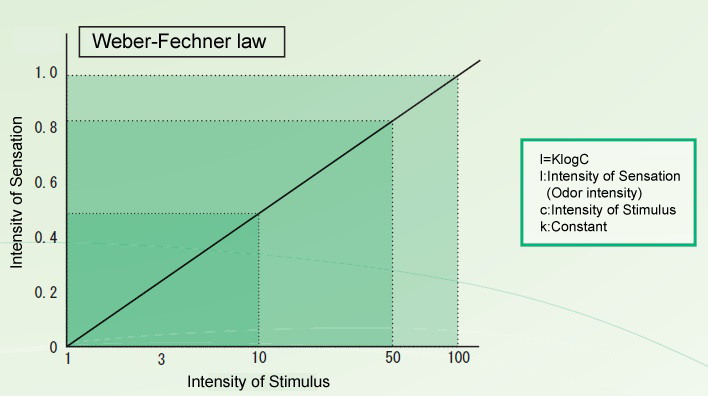Odor
The perception of odor is highly subjective; a scent that is pleasant to one person may be offensive to another. For instance, while some enjoy the aroma of perfume, an overpowering fragrance can be unpleasant for everyone. It is said that there are more than 400,000 kinds of odor molecules, and different concentrations and mixtures can strengthen a scent or even neutralize it to make it undetectable.

Concentration of Odorous Substances and How Odors Are Detected
We sense odors when we inhale substances that have vaporized in the air. The concentration of such substances is expressed in ppm, which is an extremely small unit of measurement. PPM refers to parts per million. For example, if 0.1 ppm of the components of a gas is collected from 10 m3 (Cubic meters) of air, that is only 1 cm3 (Cubic centimeter) in terms of the volume of the gas. In liquid form before the gas is volatilized, this would amount to only about 5 mg.
Another interesting point is that the concentration of odorous substances in the air is not proportional to the strength of the odor. This is due to our sense of smell. It is said that the quantity and concentration at which we sense an odorous substance follow the Weber-Fechner law.

According to this law, even if the concentration of odorous substances is reduced by half, the strength of the odor decreases by only about 15%. If the concentration of odorous substances is reduced by 90%, then the strength of the odor decreases by half.
Bad Odors
In many industrial and laboratory settings, malodors often originate from sources like solder fumes, resins, solvents, and other chemicals. There are various kinds of malodorous substances, and some may cause health problems depending on the substance. Continuing to inhale such odors could lead to liver damage, kidney damage, anemia, and inflammation of the skin and mucous membranes. Symptoms of such illnesses include exhaustion, sluggishness, headaches, and dizziness. In addition, smoke particles can cause asthma and other lung diseases, or lead to allergies. If you are exposed to the same odor for a long time, you might lose the ability to sense that odor. This is because your nose becomes desensitized. However, even if your nose becomes desensitized to a bad odor, your brain will continue to be subjected to the strong stress that accompanies it. Persistent exposure to malodors can negatively impact both our physical and mental well-being.

Odor Control and Mitigation Strategies
Since we can have a strong reaction to odors even in trace amounts, it is important to prevent the spread of odors from their sources. Effective measures include sealing the locations where odors occur and keeping work areas thoroughly clean. If it is not possible to seal a location where odors are generated, either use a deodorizer to remove the odor or ventilate the area with an exhaust device.
When addressing unwanted odors, it's helpful to distinguish between two primary methods: deodorization and odor elimination.
Deodorization: This is a physical process of removing odor-causing substances from the air, typically through methods like ventilation or adsorption.
Odor Elimination: This is a chemical process that neutralizes or breaks down odor molecules themselves.
In workplace environments where odors originate from continuous processes like soldering or the use of solvents, eliminating the source is often impossible. Therefore, deodorization becomes the critical strategy. The most common and effective method for this in industrial settings is adsorption-based fume extraction.
* Organic solvents and other substances must be controlled and used in accordance with laws and regulations, depending on the volume and type. Be sure to refer to applicable laws and regulations, as necessary.
Activated Carbon and Odors
Activated carbon has been used for a long time to remove odors. Odor molecules are attracted to and adsorbed by the surface of activated carbon. The surface of activated carbon is a mesh of fine pores (10 to 200 Å in diameter). These pores create a large surface area (500 to 2500 m²/g) onto which odor molecules are adsorbed.
Even only 1 gram of activated carbon can have a surface area as large as a 50 m by 50 m square (2500 m²). This immense surface area gives activated carbon its exceptional deodorizing performance.
Matsusada Precision's fume extractors leverage a powerful multi-stage filtration system, combining high-efficiency non-woven fabric filters with specially treated activated carbon. This design ensures the effective capture of particulate matter like solder smoke and the adsorption of a wide range of volatile organic compounds (VOCs).
Our solutions are engineered to provide clean air in environments dealing with:
- Soldering fumes
- Laser marking and processing fumes
- Odors from UV printers and 3D printing resins
- Vapors from adhesives and solvents
Matsusada Precision's Fume Extraction Solutions
Matsusada Precision's Fume Extraction Solutions
For workplaces struggling with fumes and odors from soldering, laser processing, or solvents, creating a safe and comfortable environment is paramount. Matsusada Precision offers a comprehensive lineup of compact, high-performance fume extractors designed to meet these challenges. Discover how our advanced filtration technology can protect the health of your team and improve your work environment.
[Explore Our Fume and Odor Extraction Systems] (Japanese site)


